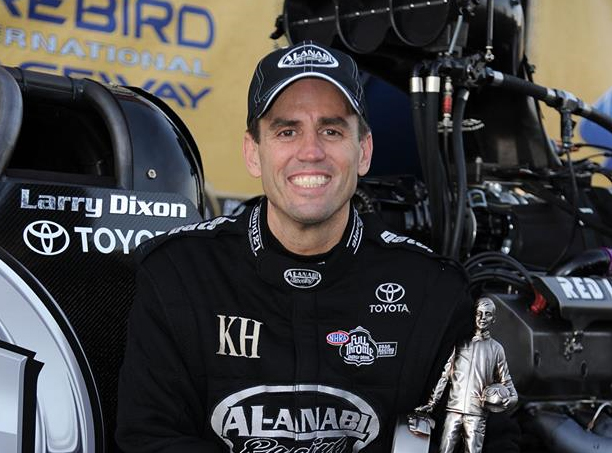
Larry Dixon Ready for More Challenges in 2016;
Three-time NHRA Top Fuel Champion Set for New Opportunities
INDIANAPOLIS, Ind. (Jan. 11, 2016) — Three-time NHRA Mello Yello Series Top Fuel
champion Larry Dixon returned to full-time racing in 2015 and, despite a spectacular and
punishing crash in March, the popular Avon, Ind., driver recorded a strong fourth place finish in
the final Top Fuel standings.
Last week, Dixon was released from Bob Vandergriff Racing following his impressive comeback
to full-time competition and now seeks new drag racing opportunities for 2016.
Dixon, the second winningest Top Fuel driver in NHRA history with 62 wins, recorded six final
round appearances in his full-time return to cockpit and proved to be in contention for a coveted
fourth Top Fuel crown in the Mello Yello Countdown.
However, the dramatic accident at the NHRA Gatornationals in March made it a tough season
for Dixon with several injuries. Larry suffered a fractured T-4 and 5 vertebrae in his (upper) back
as well as a left knee bone contusion despite not missing a race after the Gainesville incident.
“I was able to walk away from the crash at Gainesville but, to be honest, I was banged up pretty
good,” said Dixon, who became a guest on television shows such as Good Morning America,
The Today Show, Fox & Friends and CNN Morning News after the crash. “I would have gotten
back in the car the next day if we had a backup chassis. But, despite the injuries, I was able to
not miss a race. That’s how I was raised.”
The front-end on Dixon’s Top Fueler collapsed near the finish line at nearly 300 miles per hour
on a Gatornationals qualifying attempt, causing the racing machine to vault some 50 feet into
the air at over 300 mph and slammed into the retaining wall. Dixon was able to step away from
the carnage under his own power.
(Gatornationals Crash Video — https://www.youtube.com/watch?v=e0xVHPiKRec)
“The car’s front-end collapsed similar to my Memphis crash in 2000 (when Dixon suffered a
broken leg but didn’t miss an NHRA national event),” Larry explained. “I was awake through the
whole crash but I had a 109 G impact coming back down to earth and 45 G load when I hit the
wall. It was a big one and I’m so thankful that the work we did on the cars with regards to the
cockpit and safety equipment in the past 15 years did its job.”
